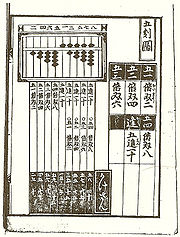
Yoshida Koyu
Encyclopedia

Japan
Japan is an island nation in East Asia. Located in the Pacific Ocean, it lies to the east of the Sea of Japan, China, North Korea, South Korea and Russia, stretching from the Sea of Okhotsk in the north to the East China Sea and Taiwan in the south...
ese mathematician
Mathematician
A mathematician is a person whose primary area of study is the field of mathematics. Mathematicians are concerned with quantity, structure, space, and change....
in the Edo period
Edo period
The , or , is a division of Japanese history which was ruled by the shoguns of the Tokugawa family, running from 1603 to 1868. The political entity of this period was the Tokugawa shogunate....
. His popular and widely disseminated published work made him the most well known writer about mathematics in his lifetime.
He was a student of Kambei Mori
Kambei Mori
Kambei Mori or , also known as Mōri Kambei Shigeyoshi , was a Japanese mathematician in the Edo period.Some 16th century sources suggest that Mori studied in China, but such claims are inconclusive or rejected by historians...
(also known as Mōri Shigeyoshi
Kambei Mori
Kambei Mori or , also known as Mōri Kambei Shigeyoshi , was a Japanese mathematician in the Edo period.Some 16th century sources suggest that Mori studied in China, but such claims are inconclusive or rejected by historians...
). Along with Imamura Chishō and Takahara Kisshu, Yoshida became known to his contemporaries as one of "the Three Arithmeticians."
Yoshida was the author of the oldest extant Japanese mathematical text. The 1627 work was named Jinkōki. The work dealt with the subject of soroban
Soroban
The is an abacus developed in Japan. It is derived from the Chinese suanpan, imported from China via Korea to Japan around 1600. Like the suanpan, the soroban is still used today, despite the proliferation of practical and affordable pocket electronic calculators....
arithmetic
Arithmetic
Arithmetic or arithmetics is the oldest and most elementary branch of mathematics, used by almost everyone, for tasks ranging from simple day-to-day counting to advanced science and business calculations. It involves the study of quantity, especially as the result of combining numbers...
, including square and cube root operations.
Selected works
In a statistical overview derived from writings by and about Yoshida Mitsuyoshi, OCLCOCLC
OCLC Online Computer Library Center, Inc. is "a nonprofit, membership, computer library service and research organization dedicated to the public purposes of furthering access to the world’s information and reducing information costs"...
/WorldCat
WorldCat
WorldCat is a union catalog which itemizes the collections of 72,000 libraries in 170 countries and territories which participate in the Online Computer Library Center global cooperative...
encompasses roughly 20+ works in 30+ publications in 1 language and 40+ library holdings.
- 1643 — , OCLC 22023455088
- 1659 — , OCLC 22057549632
- 1818 — , OCLC 22057124215
- 1850 — , OCLC 22055982082
See also
- SangakuSangakuSangaku or San Gaku are Japanese geometrical puzzles in Euclidean geometry on wooden tablets which were placed as offerings at Shinto shrines or Buddhist temples during the Edo period by members of all social classes.-History:The Sangaku were painted in color on wooden tablets and hung in the...
, the custom of presenting mathematical problems, carved in wood tablets, to the public in shinto shrines - SorobanSorobanThe is an abacus developed in Japan. It is derived from the Chinese suanpan, imported from China via Korea to Japan around 1600. Like the suanpan, the soroban is still used today, despite the proliferation of practical and affordable pocket electronic calculators....
, a Japanese abacusAbacusThe abacus, also called a counting frame, is a calculating tool used primarily in parts of Asia for performing arithmetic processes. Today, abaci are often constructed as a bamboo frame with beads sliding on wires, but originally they were beans or stones moved in grooves in sand or on tablets of... - Japanese mathematicsJapanese mathematicsdenotes a distinct kind of mathematics which was developed in Japan during the Edo Period . The term wasan, from wa and san , was coined in the 1870s and employed to distinguish native Japanese mathematics theory from Western mathematics .In the history of mathematics, the development of wasan...
(wasan)

